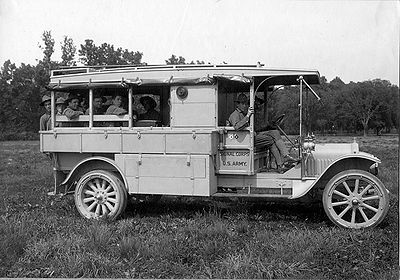1914 Radio Tractor
 The Radio tractor was a mobile Signal Corps Radio used by the U.S. Army for ground communications before and during World War I. Prior to World War I, trucks were referred to as "tractors", and there were also telegraph tractors, and telephone tractors.
The Radio tractor was a mobile Signal Corps Radio used by the U.S. Army for ground communications before and during World War I. Prior to World War I, trucks were referred to as "tractors", and there were also telegraph tractors, and telephone tractors.
Use
Very little information exists for these trucks, as most of the components were built before standardization. They first made their debut on the Mexican border in a radio intercept role, and later during World War I, some sets may have been reconfigured for RDF and other uses.
Components
- SCR-50, 2 kilowatt spark transmitter, crystal or vacuum tube detector receiver, 0.15-0.50 Megahertz
Variants
At least 3 variants are known:
- Radio Tractor No. 1
- Radio Tractor No. 2 (Four Wheel Drive)(Jeffery Quad), Unknown radio set
- Radio Tractor No. 3 (White Motor Company), SCR-50 radio set
The No.3 truck was also accompanied by a tender "Maintenance truck No. 5" later renumbered as K-5.
white manual 1918
The Signal Corps has designed and built two sizes of automobile radio sets, or tractor sets, as they are called (a) a "divisional" tractor of 1 k. w. size; (&) an "Army" tractor of 2 k. w. size. The 1 k. w. set, complete with supplies and detachment of seven men, weighs about 6,700 pounds, and on an average road is capable of making a speed of from 20 to 25 miles per hour. It carries a 60-foot sectional mast, which can be raised in a few minutes by means of guides on the roof of the tractor. The antenna is of the umbrella type, with 16 radiating wires each 75 feet long. The counterpoise is likewise of the umbrella type, laid on the ground with 8 wires, each 75 feet long. The transmitting set is of the quenched spark type, with inductively coupled circuits adjusted to radiate waves of 600, 800, 1,000, and 1,200 meters. The receiving set is of the statically coupled type similar to that in use in the 1915 radio pack sets, but of larger size and capable of reception of much longer wave lengths. The 2 k. w. set, complete with supplies and detachment of eight men, weighs about 9,000 pounds, and on an average road is capable of making a speed of at least 15 miles per hour. It carries an 80- foot sectional mast, which is raised in a manner similar to that in the 1 k. w. set. The transmitting and receiving sets are likewise similar to those in the previous set, but capable of using much longer wave lengths.


























